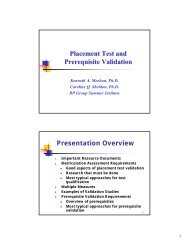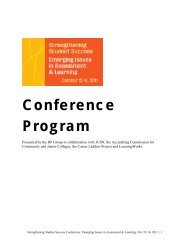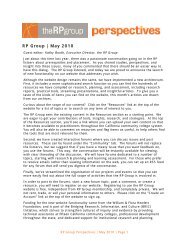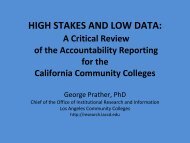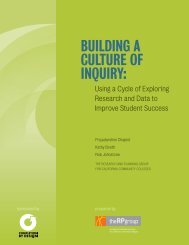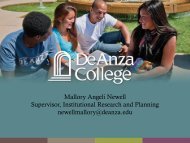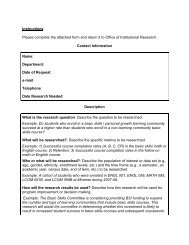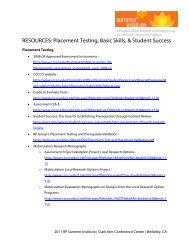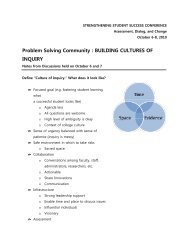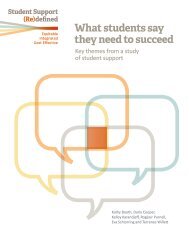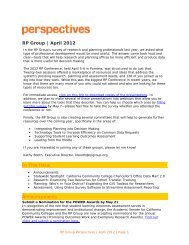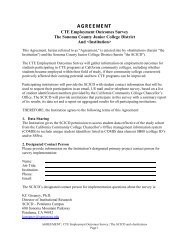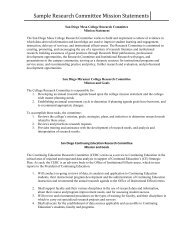Conference Program.pdf - The RP Group
Conference Program.pdf - The RP Group
Conference Program.pdf - The RP Group
You also want an ePaper? Increase the reach of your titles
YUMPU automatically turns print PDFs into web optimized ePapers that Google loves.
<strong>Conference</strong><br />
<strong>Program</strong><br />
Presented by the <strong>RP</strong> <strong>Group</strong> in collaboration with 3CSN, the Accrediting Commission for<br />
Community and Junior Colleges, the Career Ladders Project and LearningWorks<br />
Strengthening Student Success <strong>Conference</strong>: Embracing & Leading Change | Oct 3-5, 2012 | 1
Schedule Overview<br />
Wednesday, October 3<br />
8:30 – 6:00 <strong>Conference</strong> Check-In/Information Desk | B-2 Level Foyer<br />
8:30 – 3:45 Exhibitor Displays | B-2 Level Foyer<br />
9:30 – 11:00 Welcome & Keynote Presentation by Uri Treisman | Pacific I-III<br />
11:00 - 11:30 Coffee Break, sponsored by CCSSE | B-2 Level Foyer<br />
11:30 – 12:30 Briefing Session 1<br />
12:30 – 2:00 Lunch and POWER Award Presentation | Pacific I-III<br />
2:15 – 3:15 Briefing Session 2<br />
3:15 – 3:45 Coffee & Cookies Break, sponsored by Scantron | B-2 Level Foyer<br />
3:45 – 4:45 Briefing Session 3<br />
4:45 – 6:45 Reception, sponsored by eLumen | Fountain Terrace<br />
Thursday, October 4<br />
7:30 – 4:30 <strong>Conference</strong> Check-In/Information Desk | B-2 Level Foyer<br />
7:30 – 2:45 Exhibitor Displays | B-2 Level Foyer<br />
7:30 – 8:30 Continental Breakfast | Pacific I-III<br />
8:30 – 10:00 Interactive Session 1<br />
10:00 – 10:30 Coffee Break, sponsored by Nuventive | B-2 Level Foyer<br />
10:30 – 12:00 Interactive Breakout 2<br />
12:15 – 2:15 Lunch & Keynote Presentation by Chaffey College | Pacific I-III<br />
2:15 – 2:45 Coffee Break, sponsored by Wiley Learning | B-2 Level Foyer<br />
2:45 – 4:15 Interactive Breakout 3<br />
Friday, October 5<br />
8:00 – 9:00 <strong>Conference</strong> check in/information desk | B-2 Level Foyer<br />
9:00 – 1:00 Post-<strong>Conference</strong> Workshops (includes lunch)<br />
Save the Date<br />
<strong>The</strong> 2013 Strengthening Student Success <strong>Conference</strong> will be held October 9 – 11 at the San<br />
Francisco Airport Marriott.<br />
Watch the <strong>RP</strong> <strong>Group</strong> website for details later in the fall | www.rpgroup.org<br />
Strengthening Student Success <strong>Conference</strong>: Embracing & Leading Change | Oct 3-5, 2012 | 2
Briefing Session I<br />
Wednesday, October 3 | 11:30-12:30<br />
Implementation Update on the Recommendations of the Student Success Task Force<br />
Strand: Defining and Measuring Success<br />
Room: Newport Beach 2<br />
In January 2012, the Board of Governors adopted 22 recommendations from the Student Success<br />
Task Force (SSTF) that will affect virtually every facet of how community colleges operate.<br />
Major recommendations address linkages with K-12 schools, student intake and support,<br />
instructional programs and accountability. This session will explain the status of implementation<br />
efforts. <strong>The</strong> vice chancellors responsible for implementation of the SSTF recommendations, led<br />
by executive vice chancellor Erik Skinner, will explain new statute (SB 1456) and regulations<br />
that we expect will have been recently adopted (Enrollment Priorities); additional regulations<br />
that will be in process (BOG Fee Waiver, Score Card); and additional efforts underway related to<br />
instruction and professional development. Participants will have the opportunity to ask questions<br />
and it is likely that discussion will be lively.<br />
Steve Bruckman, Paul Feist, Marlene Garcia, Linda Michalowski, Patrick Perry, Barry Russell,<br />
Erik Skinner, Van Ton-Quinlivan & Dan Troy, California Community Colleges Chancellor's<br />
Office<br />
Can Diagnostic Assessment Help Improve Developmental Education in California?<br />
Strand: Building College Readiness<br />
Room: Emerald Bay 1<br />
In January 2012, the Board of Governors of the California Community Colleges adopted a<br />
recommendation that California’s community colleges develop diagnostic assessments for use<br />
across the system that would provide detailed information about each student’s specific academic<br />
strengths and weaknesses. This session will discuss what three other states—Virginia, Florida<br />
and North Carolina—have already developed, or are developing for their community colleges.<br />
<strong>The</strong>se states reforms are still in their infancy, and how they will play out over the long term is<br />
not yet clear. This session will help to clarify the crucial issues for California and how the<br />
ambitious reforms envisioned by the Task Force might differ from those being undertaken in<br />
other states.<br />
Kimberly McDaniel, California Community Colleges Chancellor’s Office; Louis Freedberg,<br />
EdSource; Pam Burdman, Independent Consultant; Robert Gabriner, San Francisco State<br />
University/<strong>RP</strong> <strong>Group</strong><br />
Rethinking the Developmental Sequence<br />
Strand: Rethinking the Developmental Sequence<br />
Room: Balboa Bay 1<br />
<strong>The</strong> days are past when colleges teach a long developmental sequence of math and English<br />
classes—often both composition and reading—without question. In recent years, in light of<br />
critical analysis of evidence and increased attention, every aspect of developmental education<br />
content, outcomes, length of sequence and instruction has been examined and in many cases,<br />
redesigned. In this session a panel of faculty members will talk about changes and their<br />
Strengthening Student Success <strong>Conference</strong>: Embracing & Leading Change | Oct 3-5, 2012 | 3
experiences in developmental courses in the classroom, in their departments and at the<br />
institutional level.<br />
Rose Asera, Asera Research and Evaluation; Jennifer Lowood, Berkeley City College; Lars<br />
Kjeseth, El Camino College; Lisa Cook, Laney College; Tue Rust, Los Medanos College<br />
What Professional Pathways? Research Findings and Ideas for Action from a Multiyear<br />
Study of Transfer in Career Majors<br />
Strand: Creating Pathways for Students<br />
Room: Laguna Beach 1<br />
A comprehensive examination of transfer in five professional disciplines reveals that California<br />
lacks a transfer superhighway in majors that prepare students for high-demand jobs. Rather,<br />
students must often navigate a confusing map of crooked roads and dead-ends. Learn what<br />
factors over 1,400 students said supported and challenged their own journey to transfer and<br />
bachelor’s degree. Explore insights both across disciplines and within specific majors from the<br />
analysis of the paths taken by 14,500 students from community college to the university.<br />
Participate in a discussion of what this research means to your own efforts to support community<br />
college to university transfer, particularly focusing on what data you might gather at the local<br />
and regional level to begin building a transfer autobahn for your students.<br />
Kelley Karandjeff, Eva Schiorring & Terrence Willett, <strong>RP</strong> <strong>Group</strong><br />
We Are One! (Or Am I Just Crazy?)<br />
Strand: How Learning Connects to Work<br />
Room: Laguna Beach 2<br />
Do institutional structures and names of units at our colleges and in the System Office tend to get<br />
in the way? Do they divide us rather than unite us to work collaboratively for the success of ALL<br />
of our students? Are CTE and transfer mutually exclusive? Join us for a discussion as we explore<br />
how students need technical skills, soft skills, basic skills and general education to get prepared<br />
for a career in the 21st century. Student success and college navigation might be improved if we<br />
reduced institutional silos and collaborated more effectively within colleges and with external<br />
partners to better prepare our students for the future.<br />
Ruth Goodin, Kiran Kamath, Gail Newman & Ryan Pedersen, Los Medanos College<br />
Sherpa: Increasing Student Success with a Recommendation Engine<br />
Strand: Creative Approaches for Supporting Students<br />
Room: Laguna Beach 3<br />
<strong>The</strong> South Orange County Community College District has created Sherpa, an academic<br />
recommendation engine that combines human expertise and predictive analytics to provide<br />
students with the right information at the right time, enabling them to make better academic<br />
decisions. Sherpa uses time, event or location-based “triggers” to deliver multimodal (email,<br />
SMS, voice, text-to-speech or Facebook announcements), personalized communications such as:<br />
helping students find acceptable alternatives when their preferred courses are full, targeting atrisk<br />
students for academic interventions, tailoring information about campus events to individual<br />
interests and pushing important tasks into students’ personal to-do lists. At this session, we will<br />
discuss the compelling nature of personalized online services, outline our development process<br />
and provide a live demonstration of the Sherpa system.<br />
Robert Bramucci & Jim Gaston, South Orange County Community College District<br />
Strengthening Student Success <strong>Conference</strong>: Embracing & Leading Change | Oct 3-5, 2012 | 4
Method-ists: Building a Data-Informed Culture<br />
Strand: Accreditation: Advancing Authentic Assessment<br />
Room: Emerald Bay 2<br />
In the Summer of 2011, Los Angeles Harbor College (LAHC) joined a national initiative to<br />
increase student success: Achieving the Dream (AtD). Success has been defined to include<br />
degree and certificate completion, retention, completion of gate-keeper courses and transfer.<br />
Through participation in AtD, LAHC has committed to find out why there are gaps in student<br />
success as well as how to eliminate barriers so that students can achieve success. A cornerstone<br />
to this process has been an extensive examination and analysis of data by a broad representation<br />
of campus members, known as the Data Team. It is through teamwork, examination,<br />
communication and collaboration that we have been able to further evidence-based decision<br />
making in addressing student equity and success.<br />
Kristi Vollmer Blackburn, Rhea Estoya & Elena Reigadas, Los Angeles Harbor College<br />
Moving Beyond Implementation: Barriers and Best Practices for Institutionalizing SLOs<br />
Strand: Institutionalizing Student Learning Outcomes<br />
Room: Emerald Bay 3<br />
Community college faculty and administrators have worked together to create the profound<br />
organizational change necessary to institutionalize SLO assessment. This session shares results<br />
of a statewide survey that examined the critical challenges colleges face at each stage of this<br />
journey and the best practices colleges used to overcome each barrier in order to close the loop<br />
on assessment. We will also discuss findings from a qualitative study that examined how well<br />
faculty members at a single community college embodied the assessment of SLOs and used<br />
assessment for pedagogical and curricular change. Together, these research projects provide an<br />
in-depth look into the current state of the community college assessment effort and provide<br />
specific recommendations to help successfully institutionalize the SLO assessment process.<br />
Lori Bennett, Moorpark College; Barbara McNeice-Stallard, Mt. San Antonio College<br />
Contextualized Academic English-Paired Courses and Reading Apprenticeship Models<br />
Strand: Improving our Practice<br />
Room: Newport Beach 1<br />
We will present our continuing work with paired courses of ESL and general education<br />
(GE)/transfer content courses (ESL with Art History 102 and 101 (Humanities), ESL and<br />
Personal Development 40, and ESL and Anthropology 102). We will describe the formation of<br />
our new Faculty Inquiry <strong>Group</strong> for Reading Apprenticeship (RA) and how we are integrating RA<br />
into our ESL and content courses through the formal pairings of our courses. Preliminary<br />
findings will be presented. This is a panel of faculty from ESL and several disciplines at West<br />
Los Angeles College. ESL students receive college credits for both ESL, (elective units) and the<br />
content courses, GE units.<br />
Alma Narez Acosta, Nancy Sander & Alice Taylor, West Los Angeles College<br />
Steering Ships: Guiding Principles for Shifting Institutional Direction<br />
Strand: Leading from the Middle<br />
Room: Balboa Bay 2<br />
Strengthening Student Success <strong>Conference</strong>: Embracing & Leading Change | Oct 3-5, 2012 | 5
This interactive session will focus on practices and principles of organizational transformation,<br />
specifically how a college-wide task force ignites enthusiasm, builds support and implements<br />
initiatives. Presenters will first describe factors that led to the formation of a basic skills task<br />
force. Presenters will also describe how the task force adapted, providing leadership even as<br />
parameters changed. Within this context, participants in this session will examine and discuss<br />
principles underlying the task force and see how these principles help model effective shared<br />
governance. Participants will also discuss lessons learned from the creation of the task force.<br />
Finally, participants will consider how the processes and principles of this task force could help<br />
inform and improve similar large-scale institutional changes at participants' own colleges.<br />
Gregory Anderson, Karen Chow, Rob Mieso & Mallory Newell, De Anza College<br />
A District's Struggle to Own, Define, Quantify and Actualize a Responsive and Responsible<br />
Definition of Student Success<br />
Strand: Critical Topics for Community Colleges<br />
Room: Newport Beach 3<br />
Nationwide accountability movements have produced a number of definitions for student success<br />
including means to measure student success. Invariably these definitions and metrics focus on<br />
transfer and completion of degrees and certificates. While these are legitimate measures of<br />
student success, they do not adequately measure the transformational educational interventions<br />
provided by community colleges for community college students. What is needed is a more<br />
comprehensive definition of student success that refocuses the issue as a process and not merely<br />
an outcome. This session will present the journey of discovery within the San Jose/Evergreen<br />
Community College District including the challenges and opportunities in finding our own way.<br />
Mike Casas, Rita Cepeda, Marjorie Clark, Maria Fuentes, Dan Hawkins, Tamela Hawley, Sam<br />
Ho, Jeffrey Lease & Charles Stevens, San Jose/Evergreen Community College District<br />
Making Scantron’s Class Climate Work for your Institution<br />
Strand: Utilizing Assessment and Learning Technology<br />
Room: Huntington Beach<br />
If you use Scantron's Class Climate to evaluate courses or you’re looking to transform your<br />
institutions evaluations, and looking for tips on how to maximize its features or have ideas for<br />
how to make it more effective, this session is for you. Structured as an open dialog, you will<br />
have the chance to: discuss key issues that you are facing in using Class Climate for student<br />
learning assessment, share stories about how you are managing reporting needs and<br />
requirements, identify gaps in current solutions and describe what functionality is needed to help<br />
meet accreditation standards and strengthen institutional effectiveness. Scantron Associate Vice<br />
President Brad Zentner will be there to answer questions, foster an exchange of solutions, and<br />
most importantly, bring back your perspectives on how Scantron could be more responsive to<br />
your needs.<br />
Brad Zentner, Scantron<br />
Strengthening Student Success <strong>Conference</strong>: Embracing & Leading Change | Oct 3-5, 2012 | 6
Briefing Session 2<br />
Wednesday, October 3 | 2:15-3:15<br />
Why Don't We Just Ask <strong>The</strong>m: Using Student Voice and Opinion in Decision Making<br />
Strand: Defining and Measuring Success<br />
Room: Newport Beach 2<br />
In 2010, Los Angeles Southwest College became an Achieving the Dream (AtD) college. An<br />
integral part of being an AtD college is reaching out to students and gaining input on their<br />
experiences and challenges. What students have told us has not only changed how we look at our<br />
instruction and how we offer services, it has also transformed students roles in empowering<br />
themselves and becoming engaged in their own education. In this workshop, we will outline our<br />
methods for gathering student input and using this data to plan and implement student success<br />
initiatives throughout the college. This practical how-to workshop will give attendees tools to use<br />
as soon as they return to their campuses.<br />
Patrick Jefferson & Sabrena Turner-Odom, Los Angeles Southwest College<br />
Assessing Transcript-Based Placement<br />
Strand: Building College Readiness<br />
Room: Emerald Bay 1<br />
This summer, 20 California community colleges participated in a study that explored the efficacy<br />
of transcript analysis for assessing college-readiness, based on research done by Long Beach<br />
City College (LBCC). LBCC found that local high school grades were unrelated to placement,<br />
but were the strongest predictors of course performance, whereas 11th grade California<br />
Standards Test scores were the best predicator of placement but only weakly related to college<br />
success. This session will share the results of the statewide study, including variables that<br />
appeared to influence the usefulness of transcript analysis. Representatives from Long Beach<br />
City College will then describe how the results of their earlier study were translated into a large<br />
pilot project that is exploring methods of augmenting and enhancing the college’s existing<br />
assessment process.<br />
John Hetts & Mark Taylor, Long Beach City College; Terrence Willett, <strong>RP</strong> <strong>Group</strong><br />
<strong>The</strong> Laissez-Faire College: Findings from a Two-Year Study on Basic Skills<br />
Strand: Rethinking the Developmental Sequence<br />
Room: Balboa Bay 1<br />
This session will present many of the findings of a two-year study of basic skills programs in the<br />
California community colleges that included 20 colleges, 323 interviews with faculty and<br />
administrative staff and 169 classroom observations. Findings have been organized into four<br />
topics: remedial pedagogy; fragmentation of services; islands of innovation; and structural<br />
obstacles to alignment of assessment, student services and instruction. Session participants will<br />
discuss four major questions: What is the cost for transforming the community colleges? How<br />
can colleges establish sustainable and renewable practices that support student success? How can<br />
colleges integrate the delivery of student services and instruction? How can colleges evolve into<br />
organizational risk-tolerant cultures supporting innovation and sustainable change?<br />
Laura Hope, Chaffey College; Robert Gabriner, San Francisco State University/<strong>RP</strong> <strong>Group</strong><br />
Strengthening Student Success <strong>Conference</strong>: Embracing & Leading Change | Oct 3-5, 2012 | 7
Priority Registration for High School Seniors<br />
Strand: Creating Pathways for Students<br />
Room: Laguna Beach 1<br />
According to the Student Success Task Force report, in the 2009-2010 academic school year,<br />
approximately 137,000 first-term students were unable to register for a single course. In 2011, as<br />
part of a strategic planning initiative, West Hills Community College District (WHCCD)<br />
modified its priority registration process to include high school seniors. This resulted in an<br />
increase of 34% of feeder high school graduate enrollments. Chancellor Jack Scott has praised<br />
WHCCD for the implementation of a priority registration process that includes high school<br />
seniors and addresses many of the matriculation requirements outlined by the Student Success<br />
Task Force. This session will provide an overview of the work and collaboration required to<br />
implement a priority registration process for high school seniors.<br />
Erin Corea, West Hills College Coalinga; Sylvia Dorsey-Robinson & Joel Ruble, West Hills<br />
College Lemoore; Pedro Avila, West Hills Community College District<br />
Separated at Birth? <strong>The</strong> Twin Proficiencies of Work and Civic Engagement<br />
Strand: How Learning Connects to Work<br />
Room: Laguna Beach 2<br />
Employers tell us they want graduates who can think independently and express themselves<br />
originally, yet work with colleagues from across disciplinary cultures and around the world. For<br />
many, the new emphasis on collaboration departs from the traditional approach of solitary<br />
intellectual development. Constantly connected, we're expected to solve problems, build<br />
businesses and even invent and learn as members of teams. Are we ready to prepare our students<br />
for lives that will be led more collectively than ours? And what does American higher education<br />
have to contribute, with its tradition of shared governance? Our responses will shape our colleges<br />
and universities for decades to come, as we reconcile the twin proficiencies of work and<br />
community.<br />
Ken O'Donnell, California State University Office of the Chancellor<br />
<strong>The</strong> Rio Hondo College Gateway Tutoring <strong>Program</strong>: An Integrated Approach to Learning<br />
Support and Student Success<br />
Strand: Creative Approaches for Supporting Students<br />
Room: Laguna Beach 3<br />
Adopted in 2009 as a Basic Skills Initiative project, the Gateway Tutoring <strong>Program</strong> has provided<br />
an integrated approach to tutoring services at Rio Hondo College. Furthermore, it has become a<br />
key component of an emerging first-year student success framework, which guides and supports<br />
students from prematriculation through transfer and/or degree completion. This workshop will<br />
highlight the planning, implementation and on-going development and evaluation of this best<br />
practice tutoring program.<br />
Robert Holcomb & Lydia Okelberry-Gonzalez, Rio Hondo College<br />
Pinpointing Areas to Improve: New Accreditation Expectations for Disaggregating Data<br />
Strand: Accreditation: Advancing Authentic Assessment<br />
Room: Emerald Bay 2<br />
Colleges have always looked for ways to use student success metrics to assess institutional<br />
effectiveness and increase student achievement. Beginning Fall 2012, all colleges conducting<br />
Strengthening Student Success <strong>Conference</strong>: Embracing & Leading Change | Oct 3-5, 2012 | 8
self-evaluations as part of the accreditation process will be expected to sufficiently disaggregate<br />
student success data to pinpoint areas where resources and efforts need to be repurposed to<br />
improve outcomes for all students. What are the specific expectations for capturing and<br />
documenting our efforts to measure and improve student success? How do we use existing data<br />
resources at our disposal to collect and report the evidence? Specific strategies will be shared by<br />
college researchers tackling these new reporting expectations.<br />
Barbara Beno, ACCJC; Gregory Stoup, Canada College; Robert Pacheco, MiraCosta College;<br />
Daniel Martinez, Riverside Community College<br />
Exemplary Student Learning Outcomes Assessment: <strong>The</strong> Only Constant Is Change<br />
Strand: Institutionalizing Student Learning Outcomes<br />
Room: Emerald Bay 3<br />
Across California, key stakeholders are leading the way in assessing and improving learning<br />
outcomes as we strive to improve opportunities for students to achieve their educational goals.<br />
This work varies from college to college and even from one program or department to another.<br />
One key feature remains constant, however, and that is the concept of change. Thus, the power to<br />
leverage change will be the focus in this session, as winners of the Promising Outcomes Work<br />
and Exemplary Research (POWER) Awards provide their perspectives on the work that they<br />
have accomplished. After each brief presentation, small groups will discuss how to apply lessons<br />
learned about change from these award winners. Plan on walking away with both a refreshed<br />
attitude and some concrete tools for your own work in improving student success.<br />
Gregory Anderson, De Anza College; La Shawn Brinson, Los Angeles Southwest College; Fred<br />
Hochstaedter, Monterey Peninsula College; Arkady Hanjiev, West Hills College Coalinga<br />
New Approaches to Using Labor Market Information to Improve Student Decisions<br />
Strand: Improving our Practice<br />
Room: Newport Beach 1<br />
While a postsecondary education is critical in today’s economy, not all postsecondary education<br />
and training programs are equally good fits, particularly for individuals with limited time and<br />
means to invest. In this session, Jobs for the Future (JFF) will share strategies to identify a range<br />
of best bet programs. Drawing on one of its newest initiatives, Counseling to Careers, JFF will<br />
offer an approach to identify quality career pathways in your region, determine the skills and<br />
experience needed to enter and advance in those pathways and find best bet programs that lead to<br />
employment in those pathways. Strategies and materials presented in this session can position<br />
colleges and their community partners to do a much better job helping students and their families<br />
make informed postsecondary decisions.<br />
Todd Weissman, Jobs for the Future<br />
So Many Initiatives, So Little Communication: How to Build a Community of Practice<br />
Devoted to Student Success<br />
Strand: Leading from the Middle<br />
Room: Balboa Bay 2<br />
We noticed that we were all having conversations in the halls, the lunch area and our offices<br />
about the great projects we were doing across the college conversations that pointed to great<br />
ideas needing to be shared. We needed a score card to keep track of all the things we were doing.<br />
<strong>The</strong> solution was to hold a Student Success Summit, which has become a very effective yearly<br />
Strengthening Student Success <strong>Conference</strong>: Embracing & Leading Change | Oct 3-5, 2012 | 9
event informing the college community about existing projects and creating incredibly fertile<br />
ground where new student success ideas could develop. Participants who attend this session will<br />
experience the highly interactive format of our summit, discover how we put these events<br />
together and receive agenda/guidebook samples.<br />
Ted Blake, Patricia James & Janice Levasseur, Mt. San Jacinto College<br />
Contextualization, Tutoring and Acceleration in an Urban ESL <strong>Program</strong><br />
Strand: Critical Topics for Community Colleges<br />
Room: Newport Beach 3<br />
While research studies have highlighted contextualization, acceleration and tutoring as some of<br />
the most promising approaches to address basic skills, few examples of the use of these<br />
approaches to engage ESL students with college-level material have been presented to date.<br />
Models of contextualized learning, individualized student support and an accelerated curriculum<br />
in a large ESL program will be described and made visible through the use of video. Student<br />
voice videos will illuminate students perspectives on their learning in the Green Jobs Education<br />
<strong>Program</strong>, ESL Writing Workshop and accelerated ESL curriculum at Laney College. Participants<br />
will be encouraged to explore the specific models, strategies and student responses presented to<br />
come up with their own ways of using these approaches in their practice, programs and colleges.<br />
Lisa Cook, Sonja Franeta & Suzan Tiemroth-Zavala, Laney College<br />
Meeting Two Institutional Challenges at Once<br />
Strand: Utilizing Assessment and Learning Technology<br />
Room: Huntington Beach<br />
Each college now faces the double challenge of increasing the number of completers (courses<br />
and degrees) and clearly specifying what these students know and can do. To enable colleges to<br />
meet these two challenges together, instead of having them be at odds which each other, eLumen<br />
has significantly expanded its capabilities. It now handles completion outcomes as well as<br />
learning outcomes. Within SLOs, it now supports multiple models electronic submission of<br />
assessment reports, electronic creation of reports with prompts, submission of aggregated data in<br />
addition to per-student assessment. We still believe the latter is best because it engages students,<br />
but each department can now move toward this goal on its own timeline and still be part of<br />
institutional reports all along the way.<br />
David Shupe, eLumen<br />
Briefing Session 3<br />
Wednesday, October 3 | 3:45-4:45<br />
Introducing Equity Achievement as a Strategy for Strengthening Student Success<br />
Strand: Defining and Measuring Success<br />
Room: Newport Beach 2<br />
In the Summer of 2011, Los Angeles Harbor College (LAHC) joined a national initiative to<br />
increase student success: Achieving the Dream (AtD). Through participation in AtD, LAHC has<br />
committed to find out why there are gaps in student success, as well as how to eliminate barriers<br />
so that students can achieve success. A cornerstone to this process has been an extensive<br />
examination and analysis of data by a broad representation of campus members, supported by<br />
Strengthening Student Success <strong>Conference</strong>: Embracing & Leading Change | Oct 3-5, 2012 | 10
campus leaders in order to sustain ongoing improvement. In Spring 2012, we conducted student<br />
focus groups to ask questions about obstacles in students' paths to success. Equity and cultutural<br />
competence in education became an area for us to strengthen. We will explain our process as<br />
well as our five-year plan to strengthen equity.<br />
Kristi Vollmer Blackburn & Jassiel Dominguez, Los Angeles Harbor College<br />
Focusing on College Readiness with High School Seniors<br />
Strand: Building College Readiness<br />
Room: Emerald Bay 1<br />
A partnership between Clovis West High School and Willow International College Center has<br />
resulted in a substantial increase in the percentage of Clovis West High School seniors who have<br />
placed directly into college-level English and will therefore not require remediation. Students are<br />
being taught to read, think and write critically through a variety of rhetorical strategies using<br />
college-level nonfiction literature based on the Common Core Standards. A team of Clovis West<br />
English teachers and Willow International English instructors are discussing curriculum<br />
alignment and monitor student academic performance as well as student academic behaviors. As<br />
a result of this collaboration, the percentage of Clovis West High School students placing into<br />
freshman English increased by 76%.<br />
Karen Boone & Ellen Surra Melocik, Clovis West High School; Jeff Burdick, Willow<br />
International College Center<br />
Preparing Students for Success in Transfer-level Composition: Faculty Beliefs and Student<br />
Experiences<br />
Strand: Rethinking the Developmental Sequence<br />
Room: Balboa Bay 1<br />
English faculty believe that developmental students need a strong foundation in reading and<br />
writing to succeed in transfer-level composition. On the basis of this belief, the English<br />
department at Ohlone College established a reading prerequisite to freshman composition.<br />
Institutional data suggest this prerequisite has improved student success in writing courses.<br />
However, indepth interviews and case studies of students as they move from developmental to<br />
transfer-level classes reveal many of the challenges these students face, as well as how they<br />
overcome these challenges to be successful. This session will be an opportunity to share<br />
methodology, data and conclusions about a reading prerequisite, as well as ways to support<br />
success as basic skills students move into transfer-level English classes.<br />
Alison Kuehner, Ohlone College<br />
Scalable Success for All Students: Curriculum Redesign, Supplemental Learning and First-<br />
Year Experience <strong>Program</strong>s<br />
Strand: Creating Pathways for Students<br />
Room: Laguna Beach 1<br />
College of the Canyons, through a holistic approach with instruction and student support<br />
services, has implemented new programs and curriculum designed to improve student success<br />
and progress towards their educational goals. <strong>The</strong>se programs include a First Year Experience<br />
(FYE) program for first-time full-time freshmen, supplemental learning activities and<br />
development of a new, accelerated developmental math course (Intermediate Algebra for<br />
Statistics) for non-STEM (Science, Technology, and Engineering Majors) and non-business<br />
Strengthening Student Success <strong>Conference</strong>: Embracing & Leading Change | Oct 3-5, 2012 | 11
majors. <strong>The</strong>se programs address the needs of all students by providing enrollment and<br />
persistence opportunities and support for course-level success. Large-scale pilot programs, a<br />
uniform evaluation tool developed for Basic Skills Initiative funded projects and meetings to<br />
discuss program changes and implementation have enabled the college to make an overall<br />
commitment to student success.<br />
Joe Gerda, Audrey Green, Daylene Meuschke & Denee Pescarmona, College of the Canyons<br />
Create a Support <strong>Program</strong> that Promotes the Advancement of Immigrant Professional<br />
Students<br />
Strand: How Learning Connects to Work<br />
Room: Laguna Beach 2<br />
This workshop will outline steps to create a support services program that promotes the<br />
educational and employment transition of immigrant professionals who earned college/university<br />
degrees in their country of origin. Practical developmental steps will be outlined and discussion<br />
topics will include the reasons and value of developing, implementing and maintaining a<br />
program that enforces the incorporation of immigrant professional talents in the workforce and<br />
higher education. Session participants will discuss and develop ideas for developing similar<br />
programs in their institutions.<br />
Sheyla Castillo, San Diego Community Colleges Continuing Education<br />
Supplemental Instruction: Implementation, Outcomes and Recommendations for<br />
California Community Colleges<br />
Strand: Creative Approaches for Supporting Students<br />
Room: Laguna Beach 3<br />
Supplemental Instruction (SI) was recently included in the Student Success Task Force<br />
recommendations for California community colleges. What does this model look like? Does it<br />
increase student success? Butte College implemented their SI program with grant funding in Fall<br />
2009. Data since this time shows that the program supports student success in a variety of<br />
disciplines. Presenters will share quantitative data as well as qualitative data that support students<br />
increased confidence, interdependence and fluency with study skills, as well as faculty input on<br />
how the program enhances the classroom environment overall. Learn from our challenges to<br />
create a pilot or improve similar programs on your campus. This session is appropriate for<br />
faculty in STEM disciplines, basic skills and other disciplines; program developers;<br />
administrators and researchers.<br />
April Hennessy & Miya Squires, Butte College<br />
Federal Regulations and National Conversations Impacting Accreditation Practices and<br />
Policies<br />
Strand: Accreditation: Advancing Authentic Assessment<br />
Room: Emerald Bay 2<br />
ACCJC/WASC President Dr. Barbara A. Beno will provide current information from the US<br />
Department of Education’s regulations on incentive compensation, misrepresentation, gainful<br />
employment, the credit hour, state authorization, distance education and the two-year rule. Dr.<br />
Beno will also talk about pressures from the national dialogue on changes in accreditation<br />
transparency, public disclosure, greater focus on student outcomes and other emerging topics.<br />
Barbara Beno & Susan Clifford, ACCJC<br />
Strengthening Student Success <strong>Conference</strong>: Embracing & Leading Change | Oct 3-5, 2012 | 12
Assessment into Action: Using Results to Drive Curricular and Pedagogical Change<br />
Strand: Institutionalizing Student Learning Outcomes<br />
Room: Emerald Bay 3<br />
After investigating ways of improving the number of students who complete the developmental<br />
English/ESL sequence and reviewing the results of the SLO assessment for the transferable<br />
English course (English 1A), Berkeley City College (BCC) English and ESL faculty<br />
implemented a departmental portfolio review process that drastically changed the developmental<br />
sequence the departments provide, the pedagogy and design of their courses and the mechanisms<br />
for professional development. In this presentation, a developmental English instructor, ESL<br />
instructor and campus SLO coordinator will share how weaving together SLO assessment,<br />
professional learning and course design have led to an accelerated, clear and cohesive<br />
English/ESL sequence while also invigorating the practice and identity of the faculty and<br />
department.<br />
Jenny Lowood, Cleavon Smith & Gabe Winer, Berkeley City College<br />
Rethinking Equitable Student Success through Developmental Evaluation<br />
Strand: Improving our Practice<br />
Room: Newport Beach 1<br />
<strong>The</strong> developmental evaluation method enables practitioner to become aware of their cultural<br />
beliefs, assumptions and values as they participate in action research projects related to minority<br />
student underachievement. Developmental evaluation establishes social and personal interactions<br />
that encourage practitioners to agree on the processes and procedures that establish ongoing<br />
observations, reflections and action as institutional effectiveness and equity are evaluated.<br />
Participation in all aspects of the evaluation process is elicited by asking evaluative questions,<br />
using evaluation logic and gathering data from these questions, which makes ongoing data-based<br />
decision making possible as practitioners evaluate the effectiveness of institutional programs.<br />
<strong>The</strong> results of CUE’s action research work with STEM faculty at the community college and<br />
state university will be presented to show STEM faculty involvement in developmental<br />
evaluation.<br />
Peggy Smith & Chelvi Subramaniam, University of Southern California<br />
Building Faculty Engagement in Improving Outcomes<br />
Strand: Leading from the Middle<br />
Room: Balboa Bay 2<br />
When community colleges make a deep commitment to faculty engagement by supporting high<br />
quality instruction, providing access to data on student outcomes, and creating opportunities to<br />
test out potential improvements, they see results. This session shares lessons learned from<br />
finalists for the Aspen Prize and other institutions that have built cultures of continuous<br />
improvement. You will learn how Valencia College structured its professional development and<br />
tenure processes to support high caliber instruction and ongoing inquiry, a four-step process for<br />
instigating a similar transformation at your own institution, activities to help support this process<br />
and answers to common sticking points, plus hear examples of how this process has been applied<br />
in a variety of institutional contexts.<br />
Rose Asera, Asera Research and Evaluation; Kathy Booth, <strong>RP</strong> <strong>Group</strong><br />
Strengthening Student Success <strong>Conference</strong>: Embracing & Leading Change | Oct 3-5, 2012 | 13
Developmental Education Learning Communities: What Works? What Doesn't? What's<br />
Next?<br />
Strand: Critical Topics for Community Colleges<br />
Room: Newport Beach 3<br />
New research shows that learning communities can help students progress through their required<br />
developmental education courses. Yet the same studies highlight the fact that these programs are<br />
difficult to implement consistently or bring to scale. Furthermore, while learning communities<br />
often have short-term impacts, there is mixed evidence on longer-term impacts. Are learning<br />
communities a valuable tool for student success? MDRC researchers and college leaders will<br />
draw lessons from evaluations with over 7,000 students at six community colleges, leading a<br />
conversation around the implications for practice: What have we learned to improve learning<br />
communities for students in developmental education? How can we move forward ensuring that<br />
learning communities fit into larger and broader strategies for success across the campus?<br />
Alex Mayer & Evan Weissman, MDRC; Audrey Yamagata-Noji, Mt. San Antonio College; Mary<br />
Beth Love, SF State/CCSF Metro Academies<br />
<strong>The</strong> Benefits of an Online Assessment System: Using Taskstream for Outcomes Assessment<br />
and <strong>Program</strong> Review<br />
Strand: Utilizing Assessment and Learning Technology<br />
Room: Huntington Beach<br />
In 2009 San Diego City College adopted Taskstream, an online assessment system. This session<br />
will describe both the work involved and the benefits derived from the adoption of this<br />
multifaceted program. We will describe some of the challenges, as well as highlight what we<br />
perceive to be the many advantages of this online assessment system, including how we used the<br />
tool to establish our college’s proficiency level in outcomes assessment.<br />
Dotti Cordell & Berta Harris, San Diego City College<br />
Interactive Session 1<br />
Thursday, October 4 | 8:30-10:00<br />
Measuring Our Success: Providing Evidence for CTE Outcomes<br />
Strand: Defining and Measuring Success<br />
Room: Newport Beach 2<br />
If the ultimate goal of a CTE program is prepare a student for employment, shouldn’t our<br />
measure of success be whether students find jobs in their field of study? Cabrillo College has<br />
been surveying CTE students since 2000 to assess employment outcomes. This year 14 colleges<br />
have joined with the <strong>RP</strong> <strong>Group</strong> and the Bay Area Community College Consortium to pilot a<br />
similar study. More colleges plan to participate in the next round. This workshop will review the<br />
motivations for the study, overview the major findings and present how City College of San<br />
Francisco intends to apply the findings to drive program improvement. Workshop participants<br />
will explore the implications of wider use of follow-up studies of employment and the potential<br />
impacts on programs and funding.<br />
Rock Pfotenhauer, Cabrillo College; Beth Cataldo, City College of San Francisco; KC Greaney,<br />
Santa Rosa Junior College<br />
Strengthening Student Success <strong>Conference</strong>: Embracing & Leading Change | Oct 3-5, 2012 | 14
Foundation for Success<br />
Strand: Building College Readiness<br />
Room: Emerald Bay 1<br />
Through its Trade Bridge Academy, LATTC has re-engineered how students are oriented and<br />
prepared to succeed in college by implementing a nine-hour noncredit Introduction to Post-<br />
Secondary Education course, a pre-placement diagnostic assessment and noncredit math/English<br />
refresher courses for all new and returning students. Data has shown significant student success<br />
in course completion, persistence and credit math and English course success. Course objectives<br />
for the noncredit introduction to college course are: (1) bridge students from community to<br />
college, (2) foster emotional intelligence competencies, (3) build networking and relationship<br />
building skills, (4) change students internal tapes and myths, (5) build critical thinking skills, (6)<br />
introduce students to available post-secondary program options and (7) provide students with<br />
information and skills to navigate campus and community services and resources.<br />
Maryanne Galindo, Joe Guerrieri, Dorothy Smith & Allison Tom-Miura, Los Angeles Trade-<br />
Technical College<br />
<strong>The</strong> Pedagogy of Acceleration: Classroom Practices in Pilot English Courses at Three<br />
Community Colleges<br />
Strand: Rethinking the Developmental Sequence<br />
Room: Balboa Bay 1<br />
In this session, English faculty from three community colleges will share the specific ways in<br />
which they have taught their pilot accelerated courses differently from their usual practice in<br />
developmental composition courses. We will focus on three areas in which our pedagogy has<br />
most deliberately and dramatically changed: intensified reading instruction, just-in-time<br />
remediation and greater attention to the affective domain. Presenters will share particular<br />
strategies in each area and participants will generate ideas for how they might apply these<br />
principles in their own classrooms to better prepare students in developmental English for<br />
success in transfer-level courses.<br />
Jeanne Costello, Fullerton College/3CSN; Bridget Kominek, Fullerton College; Melissa Reeve,<br />
Solano Community College; Kyra Mello, Yuba College<br />
Santa Ana ¡Adelante! — Ensuring a College Degree in Every Home by 2025<br />
Strand: Creating Pathways for Students<br />
Room: Laguna Beach 1<br />
<strong>The</strong> Santa Ana ¡Adelante! initiative guarantees that all 56,937 Santa Ana Unified School District<br />
students who graduate from high school, enroll at Santa Ana College and complete all academic<br />
and application requirements for transfer admission will be admitted to CSU-Fullerton or UC-<br />
Irvine. With the solid support of a broad coalition of educational stakeholders, civic leaders,<br />
community-based organizations, foundations, Latino organizations, business, media sources,<br />
parents and students, this recently launched model has implemented a new era of Latino student<br />
college access and success in the country’s most Latino city. At a time when public postsecondary<br />
institutions are finding it hard to accept more students, Santa Ana ¡Adelante! serves as<br />
a model of collaboration to ensure prepared students have guaranteed admission.<br />
Melba Schneider Castro, California State University, Fullerton; Micki Bryant & Sara Lundquist,<br />
Santa Ana College; Ed Winchester, Santa Ana Unified School District; Santana Ruiz, University<br />
of California, Irvine<br />
Strengthening Student Success <strong>Conference</strong>: Embracing & Leading Change | Oct 3-5, 2012 | 15
Empowering Students to Succeed in College and Career<br />
Strand: How Learning Connects to Work<br />
Room: Laguna Beach 2<br />
Join us to discuss innovative and integrative approaches focused on preparing students for both<br />
college and career. We will provide an overview and contacts for statewide initiatives which<br />
involve the California Community Colleges and local workforce boards including Community<br />
College Pathways for Former Foster Youth and California College Pathways. You will hear from<br />
specific colleges that have evidence-based approaches in providing their students with effective<br />
strategies and techniques which equip them for success in the classroom and on the job. Features<br />
will include video, strategies that empower students to achieve despite multiple barriers and<br />
innovative practices that enhance learning and contribute to vocational success.<br />
Carol Davies & Devon Werble, Career Ladders Project; Dione Washington, Los Angeles Trade<br />
Technical College; Dameion Renault, Orange Coast College/CLP; Chris Dech, Riverside City<br />
College/CLP<br />
Complex Lives: Educating the Whole Person<br />
Strand: Creative Approaches for Supporting Students<br />
Room: Laguna Beach 3<br />
What strengths and needs do our students bring to community college? What hopes and fears?<br />
Why is it important for colleges to understand the complexity of students lives? Two programs<br />
will share the ways they are designed to address the affective domain as an integral part of<br />
students academic development and performance. <strong>The</strong> Academy for College Excellence (ACE)<br />
has incorporated hope, self-efficacy, connection, self-identity and mindfulness into an integrated<br />
academic program. Chaffey College has organized a campus-wide initiative on hope. <strong>The</strong>se<br />
programs will share what they have learned in research and practice about supporting students<br />
strengths and acknowledging their needs. Strengths can be built on and needs can become a great<br />
source of motivation.<br />
Rose Asera, Asera Research and Evaluation; Diego Navarro & Tue Rust, Academy for College<br />
Excellence; Rob Rundquist, Chaffey College<br />
Spotlight on Assessment: Transforming Your Campus Assessment Process and Outlook<br />
Strand: Accreditation: Advancing Authentic Assessment<br />
Room: Emerald Bay 2<br />
How do you move from doing the minimum requirements and filling out forms to making the<br />
assessment process something of value on your campus? This workshop will provide tips and<br />
proven practices from experience, including: (1) how to set up an Assessment Committee that<br />
works well and gets things done; (2) how to make assessment something of value for both<br />
instructional and non-instructional units, and from course level to GE; (3) how to integrate SLO<br />
data into decision-making processes for budget allocation and curricular changes; (4) how to<br />
develop institutional-level assessment that impacts the full institution and (5) how to involve<br />
faculty, administrators, staff and students. <strong>The</strong>re will be an opportunity to share your own<br />
successes and pitfalls and learn from each other.<br />
David Koeth, Bonnie Suderman & Bernadette Towns, Bakersfield College<br />
Strengthening Student Success <strong>Conference</strong>: Embracing & Leading Change | Oct 3-5, 2012 | 16
Developing Institutional Student Learning Outcomes<br />
Strand: Institutionalizing Student Learning Outcomes<br />
Room: Emerald Bay 3<br />
This session offers three case studies of how California community colleges are articulating and<br />
assessing institutional learning outcomes (ILOs), as well as how they are engaging faculty in<br />
discussions about the outcomes and assessment results. One college has embraced the AAC&U<br />
LEAP learning outcomes and adapted the organization’s VALUE rubrics for assessment of<br />
ILOs. A second college has orchestrated ways for faculty to engage in cross-discipline<br />
discussions where those disciplines are all contributing to a common general educational<br />
outcome. A third college has used group collaboration to develop ILOs and recently focused on<br />
using electronic surveys of college data from students both in the science disciplines and across<br />
disciplines. You will leave the session with ideas for how your college can use ILOs to inform<br />
institutional improvement efforts.<br />
Susan Clifford, ACCJC; Fred Trapp, Cambridge West Partnership; Daylene Meuschke & Paul<br />
Wickline, College of the Canyons; Greg Baxley & Sally Demarest, Cuesta College; Katy French<br />
& Marty Furch, Palomar College<br />
Lost in Transition: How Faculty across the Disciplines Can Learn to "Own" First Year<br />
Student Success<br />
Strand: Improving our Practice<br />
Room: Newport Beach 1<br />
It is easy to agree that both students and faculty need access to robust, contextualized, inquirybased<br />
and reiterative learning experiences in order to develop. One common concern is the lack<br />
of faculty drive to seek out professional learning experiences (often described as a lack of buy-in<br />
). <strong>The</strong> design and implementation of a First Year Experience (FYE) seminar taught by faculty<br />
from across disciplines has repeatedly shown to be effective in addressing student experience<br />
and faculty development goals simultaneously, but only when such efforts are rooted in a broad<br />
base of support across campus. This workshop will demonstrate the approach used by an<br />
interdisciplinary faculty team to create ongoing, sustained, campus-wide learning experiences in<br />
order to inspire interest in both professional learning and first-year student success across<br />
disciplines.<br />
Cecile Davis Anderson, Shelagh Rose & Carrie Starbird, Pasadena City College/3CSN; Nika<br />
Hogan, Pasadena City College<br />
Leading from the Middle: Navigating Organizational Cultures with a Change Agenda<br />
Strand: Leading from the Middle<br />
Room: Balboa Bay 2<br />
Using case studies and tools to assess college cultures of innovation, this session will examine<br />
successful and failed strategies for change within the community colleges. Community colleges<br />
are facing the most difficult set of challenges in their history: the evisceration of budgets and<br />
programs while addressing the need to increase student progress and success. This interactive<br />
session is primarily for practitioners from the middle of the community college organization—<br />
deans, directors, department chairs, coordinators and faculty who are leaders without title or<br />
formal authority—who are trying to promote a student success agenda in these hard times.<br />
Participants will have an enhanced understanding of how to adapt change strategies to specific<br />
Strengthening Student Success <strong>Conference</strong>: Embracing & Leading Change | Oct 3-5, 2012 | 17
institutional cultures. (This session is one part of a series developed by the Leading from the<br />
Middle initiative of the <strong>RP</strong> <strong>Group</strong>)<br />
Robert Gabriner, San Francisco State University/<strong>RP</strong> <strong>Group</strong>; Rebecca Wong, West Valley<br />
College<br />
Implementing the Student Success Task Force Recommendations<br />
Strand: Critical Topics for Community Colleges<br />
Room: Newport Beach 3<br />
Legislation and Title 5 changes have directed community colleges to implement aspects of the<br />
Student Success Task Force (SSTF) recommendations, and more modifications will occur this<br />
year. From enrollment priorities to basic skills to the scorecard, colleges are bracing for more<br />
changes that should lead to greater student success. In this breakout, we will discuss recently<br />
approved Education Code or Title 5 sections as well as those on the horizon; knowing about<br />
these updates will enable faculty leaders and their partners to design and implement important<br />
strategies for instruction and student services. Want to know how to help your college meet the<br />
challenges set forth in the SSTF recommendations? Join this breakout and learn what's coming<br />
next.<br />
Michelle Pilati & Beth Smith, Academic Senate for California Community College<br />
SOCCCD’s TracDat Implementation: from SLOs to Strategic Planning<br />
Strand: Utilizing Assessment and Learning Technology<br />
Room: Huntington Beach<br />
<strong>The</strong> South Orange County Community College District was looking for a solution to address<br />
assessment and planning at the colleges and district services. We needed a product that would<br />
house student learning and administrative outcomes, program and administrative unit reviews<br />
and our strategic plans. After trying other products, we made a unified decision to purchase<br />
TracDat for all of our needs. This presentation will focus on our initial year of implementation<br />
and the three different approaches we took with TracDat. <strong>The</strong> colleges focused on the assessment<br />
areas of SLOs and program reviews, while district services chose to focus on the district wide<br />
strategic plan and administrative unit reviews. We will share with you the lessons learned and<br />
our plans for the upcoming year.<br />
Christopher Tarman, Irvine Valley College; Scott Johnson, Nuventive; Claire Cesareo-Silva,<br />
Saddleback College; Denice Inciong, South Orange Community College District<br />
Interactive Session 2<br />
Thursday, October 4 | 10:30-12:00<br />
Don't Just Sit <strong>The</strong>re, Do Something! Developing Your College's Own Student Success Plan<br />
Strand: Defining and Measuring Success<br />
Room: Newport Beach 2<br />
Regulations, legislation and task force recommendations are dictating what community colleges<br />
should do to address student success. This session will focus on how colleges can develop their<br />
own plans for student success based on institutional needs, student data and collegial ingenuity.<br />
<strong>The</strong> presenters will share how Mt. San Antonio College hosted a Student Success <strong>Conference</strong><br />
from which a Student Success Plan was developed using a collegial approach involving faculty,<br />
Strengthening Student Success <strong>Conference</strong>: Embracing & Leading Change | Oct 3-5, 2012 | 18
students, administrators and staff. Three main goals were developed with strategic objectives<br />
ranging from facilities improvement and technological interventions to intrusive counseling and<br />
faculty development. Participants will discuss institutional approaches to initiate similar<br />
activities on their campuses and share strategies in improving student success.<br />
Glenda Bro, Thomas Mauch & Audrey Yamagata Noji, Mt. San Antonio College<br />
Readiness: Immersion and Responsiveness<br />
Strand: Building College Readiness<br />
Room: Emerald Bay 1<br />
So many of our students are not only not ready for academia, they begin college already<br />
alienated from it, hopeful but seriously fearful. Our job as educators includes attending to the<br />
affective domain as a strategy for inviting our students cognitive engagement. We will involve<br />
participants by sharing the affective practices being used by Umoja faculty from 15 colleges. We<br />
address alienation by immersing our students in the holistic college experience. This deep<br />
immersion accelerates their readiness, by challenging us instructors to be authentic and<br />
responsive. It echoes Baldwin’s call to students, “If I were you, I would force me, and, ask me<br />
the most difficult questions you can. And I would not be able to answer them. My responsibility<br />
is to hear them.”<br />
Tom deWit, Chabot College; Erin Charlens, San Diego City College; Umoja students<br />
<strong>The</strong> Network: A Three-Semester Learning Community for Basic Skills Students<br />
Strand: Rethinking the Developmental Sequence<br />
Room: Balboa Bay 1<br />
Community colleges are looking for ways to improve student success. How does a college create<br />
successful outcomes for students who start at the lowest levels of reading, writing, math and<br />
ESL? This workshop will provide a case study of Fresno City College’s process to address the<br />
needs of basic skills students. <strong>The</strong> Network’s Pilot First Year Experience program is designed<br />
with basic skills students in mind and spans nine departments and six divisions. <strong>The</strong> program<br />
provides students with the math, reading, writing and ESL courses they need beginning with<br />
their first semester of college. Come hear how they were able to launch such an ambitious<br />
endeavor and brainstorm with the facilitators and participants specific strategies to pilot or adapt<br />
existing first year experience programs.<br />
Donna Cooper, Fresno City College/3CSN; Janine Nkosi, Fresno City College<br />
Fast Track to Success: Pathways to Completion at Chaffey College<br />
Strand: Creating Pathways for Students<br />
Room: Laguna Beach 1<br />
Chaffey College designed a unique configuration of accelerated learning pathways for students<br />
in order to promote student completion and success on a large scale (100 + courses each<br />
semester). In order to provide multiple access points for students, faster and more successful<br />
completion of sequences and increased motivation and engagement in learning, Chaffey created<br />
several types of fast track courses for students at all levels of instruction (basic skills, transfer<br />
level, etc.). <strong>The</strong> presenters will share the design, implementation, research and implications of<br />
Chaffey’s program. Participants will also have the opportunity to explore strategies for building<br />
Strengthening Student Success <strong>Conference</strong>: Embracing & Leading Change | Oct 3-5, 2012 | 19
and using evidence to create, evaluate and scale up acceleration initiatives on their campuses<br />
during the interactive break-out session.<br />
Jan Connal, Cerritos College/3CSN; Angela Leontas, Giovanni Sosa, Carli Straight & Cindy<br />
Walker, Chaffey College<br />
Developing CTE Career Directed Pathways<br />
Strand: How Learning Connects to Work<br />
Room: Laguna Beach 2<br />
California Community Colleges are using diverse approaches to create effective career pathway<br />
programs to increase college completions and prepare students for the workforce, especially for<br />
students from underserved/underprepared communities who face multiple barriers to postsecondary<br />
attainment. <strong>The</strong> Career Advancement Academies (CAAs) have utilized regional and<br />
sector-based strategies to develop CTE career pathways by building partnerships between<br />
colleges and leveraging government and industry resources. <strong>The</strong> CAAs have also served as the<br />
foundation for other efforts to actively engage regional industries, local WIBs and nonprofit<br />
partners to create stackable certificate and pathway programs that foster access and completion<br />
by target populations. Presentations and dialogue by statewide CAA leadership will focus on<br />
what is involved in the development and the ongoing support of such programs.<br />
Linda Collins, Career Ladders Project; Randy Tillery, Contra Costa Community College<br />
District; Naomi Takuda, El Camino College; Anjana Richards, Skyline College; Angela Allison,<br />
West Hills Community College District<br />
Student to Student Connections: <strong>The</strong> Key to High Persistence Rates<br />
Strand: Creative Approaches for Supporting Students<br />
Room: Laguna Beach 3<br />
In the age of Facebook and texting we have found that community college students still place<br />
high value on face-to-face interactions! In a time of diminishing staff resources, implementing a<br />
<strong>Group</strong> Peer-Mentoring program at our community college was the solution to connecting<br />
students to academic and wellness resources and thus increasing persistence rates. This<br />
workshop will interactively introduce the concept of <strong>Group</strong>-Peer-Mentoring, report student<br />
benefits from the experts and creatively explore the snowball effect this service has on other<br />
student success driven services your campus may have to offer. You will leave with an action<br />
plan on how to implement this service customized to your own campus.<br />
Anneka Rogers, Columbia College<br />
Administrative Unit Assessment: Different Purposes, Different Measures<br />
Strand: Accreditation: Advancing Authentic Assessment<br />
Room: Emerald Bay 2<br />
Administrative unit assessment gathers, analyzes and uses evidence from various sources to<br />
measure program demand, quality, efficiency and effectiveness. Yet, each administrative unit<br />
plays a unique role in fulfilling the college mission and the connection to the larger institutional<br />
efforts to promote student learning often seems strained. How do successful colleges express,<br />
assess and implement administrative unit outcomes (AUOs)? What does the literature suggest are<br />
the most effective ways to tackle performance measurement in administrative areas? In this<br />
session, multiple examples of best practice from around the country will be offered and<br />
Strengthening Student Success <strong>Conference</strong>: Embracing & Leading Change | Oct 3-5, 2012 | 20
discussed, including two college models in detail. Participants will investigate and reflect on<br />
AUO design and reporting processes that fit the culture of their own institutions.<br />
Mallory Newell, DeAnza College; Elaine Kuo, Foothill College; Robert Pacheco & Gail Shirley,<br />
MiraCosta College<br />
Student Learning Outcomes Focused <strong>Program</strong> Review: An Integrated Planning Model<br />
Strand: Institutionalizing Student Learning Outcomes<br />
Room: Emerald Bay 3<br />
Academic program reviews should be driven by student learning outcomes (SLOs) and integrate<br />
SLOs with budget development and other college-wide planning processes. Two common<br />
reasons for sanctions from the Accrediting Commission for Community and Junior Colleges<br />
include lack of integration of planning with resource allocation and failure to meet requirements<br />
regarding the use of assessment results in integrated planning. Planning needs to be an<br />
interactive process that results in more effective plans and enhances student learning. This<br />
presentation will demonstrate how the College of the Canyons online program review process<br />
has evolved to integrate and link department objectives to the strategic plan, SLOs and the<br />
budget development process. We will also discuss how these principles can be applied to other<br />
colleges and the pitfalls to avoid.<br />
Barry Gribbons & Daylene Meuschke, College of the Canyons<br />
Professional Development: Lessons from Effective <strong>Program</strong>s (Puente, Umoja)<br />
Strand: Improving our Practice<br />
Room: Newport Beach 1<br />
Studies have shown that creating communities of support that both challenge and guide students<br />
as they progress through college can make the difference between staying and leaving for many<br />
students. This workshop will extract the key components and essential pedagogical approaches<br />
of these programs and discuss how particular strategies may be used as core practices by<br />
everyone that has chosen to work in the community colleges. Presenters will highlight the<br />
structural, instructional and transformative strategies that have been effective in successfully<br />
supporting students from historically marginalized backgrounds and discuss how these methods<br />
are essential to increasing completion rates.<br />
Donna Colondres, Chaffey College; Darrick Smith, LearningWorks; Julia Vergara, University of<br />
California Office of the President<br />
Leading from the Middle: Addressing Barriers to Transformational Change<br />
Strand: Leading from the Middle<br />
Room: Balboa Bay 2<br />
Relying primarily upon the experiences of the presenters and participants, this interactive session<br />
will expose the barriers within community colleges to significant change in the delivery of<br />
educational services, and engage in a dialogue on strategies to break through those barriers. As<br />
community colleges face increasing pressures to redefine their mission and refocus their scope of<br />
activities, other forces pressure them to resist transformation. Collective bargaining agreements,<br />
long-standing modes of operation, funding constraints, an aversion to risk, unbending shared<br />
governance structures, fixed hierarchies and deeply embedded and unquestioned beliefs—all of<br />
these and more can block transformations with the potential to improve outcomes for students.<br />
Participants will have an enhanced understanding of how to adapt change strategies to specific<br />
Strengthening Student Success <strong>Conference</strong>: Embracing & Leading Change | Oct 3-5, 2012 | 21
institutional cultures. (This session is one part of a series developed by the Leading from the<br />
Middle initiative of the <strong>RP</strong> <strong>Group</strong>)<br />
Gregory Anderson, De Anza College; Matt Wetstein, San Joaquin Delta College<br />
<strong>The</strong> California Acceleration Project: Where We Are Now<br />
Strand: Critical Topics for Community Colleges<br />
Room: Newport Beach 3<br />
More than 90 of the state’s 112 community colleges have participated in workshops and<br />
presentations by the California Acceleration Project since fall 2010 and 30 colleges are part of<br />
the project’s Community of Practice, an extended professional development program for faculty<br />
piloting accelerated English and pre-statistics courses. This interactive session will present the<br />
problems faculty are working to address, early results from colleges that piloted in 2011-12 and<br />
elements from the project’s lean and lively approach to faculty development.<br />
Katie Hern & Myra Snell, California Acceleration Project<br />
Using Student Engagement Data for Accreditation<br />
Strand: Utilizing Assessment and Learning Technology<br />
Room: Huntington Beach<br />
Student engagement measures can provide powerful evidence of institutional effectiveness. This<br />
session will describe how community colleges can use data from the Community College Survey<br />
of Student Engagement (CCSSE) and the Survey of Entering Student Engagement (SENSE)<br />
during the accreditation process and beyond. <strong>The</strong> facilitator will introduce the CCSSE and<br />
SENSE Accreditation Toolkits, which help colleges map survey results to regional standards.<br />
Through college examples and discussion with college practitioners, participants will gain an<br />
understanding of how colleges can use Center data to improve their accreditation processes.<br />
Angela Oriano, College Relations Center for Community College Student Engagement; Rob<br />
Johnstone, <strong>RP</strong> <strong>Group</strong><br />
Interactive Session 3<br />
Thursday, October 4 | 2:45-4:15<br />
Leading Conversations about Student Goals and Outcomes: What Course-Taking Analysis<br />
Reveals<br />
Strand: Defining and Measuring Success<br />
Room: Newport Beach 2<br />
California’s community college system encompasses a broad-ranging vision for higher<br />
education. Yet, as resources dwindle, the conversation about what constitutes success has<br />
focused on those outcomes that can be counted easily. Completion defined as the attainment of<br />
degrees and certificates or transfer to a four-year institution is increasingly becoming the<br />
yardstick for effectiveness. But does completion capture the full impact of community colleges?<br />
And if community colleges desire to demonstrate their effect on students more broadly, what<br />
should they be measuring? This session looks at the question of completion through the lens of<br />
course-taking behavior, based on a study by Peter Riley Bahr of the University of Michigan for<br />
Strengthening Student Success <strong>Conference</strong>: Embracing & Leading Change | Oct 3-5, 2012 | 22
the California Community Colleges Chancellor’s Office, and introduces a simplified<br />
methodology for investigating course-taking patterns at your own college.<br />
Gregory Stoup, Canada College; Kathy Booth & Terrence Willett, <strong>RP</strong> <strong>Group</strong><br />
Making the Case for Revising the Placement Process<br />
Strand: Building College Readiness<br />
Room: Emerald Bay 1<br />
Placement is one of the first experiences students have at community college. <strong>The</strong> Student<br />
Success Task Force identified several ways the placement process has been an obstacle rather<br />
than an entry way for students. Placement is caught in the misalignment between high school<br />
outcomes and college expectations. And, as the basic skills curriculum is redesigned, the<br />
placement process will also have to be redesigned. This session will look at the research<br />
literature on placement and will have faculty from colleges that have implemented alternative<br />
placement measures such as high school transcript analysis and self-placement discuss what they<br />
have learned.<br />
Deborah Harrington, 3CSN; John Hetts, Long Beach City College; Patricia Ewins, Moorpark<br />
College<br />
Making It Real: Integrating Reading Apprenticeship Strategies in Your Class<br />
Strand: Rethinking the Developmental Sequence<br />
Room: Balboa Bay 1<br />
Hundreds of California Community College faculty from across the disciplines and levels have<br />
explored Reading Apprenticeship (RA) and become enthusiastic proponents of using the RA<br />
framework to help students not only read for comprehension, but to develop as disciplinary<br />
thinkers and problem-solvers. Still, the process of changing the way that you teach can be slow,<br />
difficult, daunting and reiterative. In other words, revising your syllabus, assignments and<br />
assessments is a long-term learning project worthy of time, attention and support. This session<br />
will provide some of that support. Bring a course syllabus and textbooks and get ready to work<br />
with colleagues to deepen the metacognitive conversation in your classroom. Note: this<br />
workshop will be relevant and accessible to all, regardless of your prior experience with RA.<br />
Jane Wolford, Chabot College; Nika Hogan, Pasadena City College<br />
Completion and Pathways: Moving from Buzz Words to a Student-Centered Approach<br />
Strand: Creating Pathways for Students<br />
Room: Laguna Beach 1<br />
Drawing heavily from the <strong>RP</strong> <strong>Group</strong>’s work on the major national initiative Completion by<br />
Design, this session will be an interactive exploration of fundamental questions about student<br />
success within the framework of a completion agenda. We will engage in a nuanced discussion<br />
of how we can make this rhetoric relevant to work at your own college. You will have the<br />
opportunity to consider a new lens on student completion that was developed by the Community<br />
College Research Center (CCRC) at Columbia University that emphasizes student pathways<br />
through college. <strong>The</strong>n, we will explore the use of Completion by Design’s Loss-Momentum<br />
Framework to better understand students' abilities to navigate existing pathways. You will leave<br />
with tips for how to shape campus student-centered conversations about improving success.<br />
Priyadarshini Chaplot & Rob Johnstone, <strong>RP</strong> <strong>Group</strong><br />
Strengthening Student Success <strong>Conference</strong>: Embracing & Leading Change | Oct 3-5, 2012 | 23
<strong>The</strong> Power of Partnerships: Faculty Working Together across the Disciplines<br />
Strand: How Learning Connects to Work<br />
Room: Laguna Beach 2<br />
An essential element of cohort-based career pathway programs is faculty collaboration. Come<br />
listen to instructors who have successfully worked across disciplines to integrate CTE, basic<br />
skills and student success course materials and develop contextualized, project-based<br />
curriculum. <strong>The</strong> emphasis of this session will be on the nuts-and-bolts of establishing and<br />
maintaining such partnerships and building faculty learning communities.<br />
Calais Ingel & Pam Sanborn, Cabrillo College; Peter Simon, Career Ladders Project; Laura<br />
Hinckley & Renee Newell, El Camino College<br />
(Re)defining Student Support for Success<br />
Strand: Creative Approaches for Supporting Students<br />
Room: Laguna Beach 3<br />
In an environment of extreme scarcity, how can support be structured both inside and outside of<br />
the classroom to improve success for all students, and in particular for African American and<br />
Latinos? Come learn about what nearly 900 students at 13 California community colleges had to<br />
say about what helps them stay connected, engaged, directed, focused, nurtured and valued. We<br />
will provide an overview of support approaches and activities that students reported as being<br />
most important to their completion and retention while highlighting supports that can be<br />
integrated into students daily experience and/or the overall curriculum. This session will offer<br />
opportunities for you to explore how to apply what we have learned to how supports are offered<br />
and structured at your own institution.<br />
Darla Cooper & Rogeair Purnell, <strong>RP</strong> <strong>Group</strong><br />
Beyond Compliance: Breathing Life into Accreditation Processes<br />
Strand: Accreditation: Advancing Authentic Assessment<br />
Room: Emerald Bay 2<br />
Taking accreditation processes from a place of compliance to one characterized as meaningful,<br />
robust, integrated, authentic and sustainable is possible at your college. Join us in this interactive<br />
session as we explore ways to breathe life and meaning into your college’s accreditation<br />
processes by way of meaningful outcomes assessment, program review and planning. Reflecting<br />
upon your own institutional processes, along with strategies learned at the conference, we will<br />
discuss and map ways to take your college to the next level. What will emerge is a specific<br />
action plan to take back to your college.<br />
Julianna Barnes, Cuyamaca College; Leonor Perez, Grossmont-Cuyamaca Community College<br />
District<br />
Saying It All in 250 Words or Less: Tackling the Narrative Responses in the ACCJC's<br />
College Status Report on SLO Implementation<br />
Strand: Institutionalizing Student Learning Outcomes<br />
Room: Emerald Bay 3<br />
How do you explain in 250 words or less that your college meets each of the proficiency-level<br />
characteristics on the ACCJC’s Rubric on Institutional Effectiveness, Part III? In this session, the<br />
presenters will report on the types of questions SLO coordinators, ALOs and other interested<br />
parties have been asking about the College Status Report on SLO Implementation. <strong>The</strong><br />
Strengthening Student Success <strong>Conference</strong>: Embracing & Leading Change | Oct 3-5, 2012 | 24
presenters and participants will engage in an interactive discussion about what these questions<br />
mean in terms of prioritizing the content of the narrative responses and balancing the quantitative<br />
and qualitative evidence to be included. Participants will have the opportunity to examine<br />
hypothetical campus situations and develop criteria for what to include in the narrative analyses<br />
and table of evidence. <strong>The</strong> session will close with a discussion on what other colleges are<br />
identifying as areas for improvement to meet the Accreditation Standards about SLOs.<br />
Susan Clifford, ACCJC; Anu Khanna, DeAnza College; Sarah McLemore, Glendale Community<br />
College<br />
Bringing the <strong>Conference</strong> Home: a Professional Development Implementation Strategy<br />
Session with 3CSN<br />
Strand: Improving our Practice<br />
Room: Newport Beach 1<br />
It is motivating and inspiring, throughout the conference, to learn how various colleges have<br />
implemented professional development programs and policies to strengthen student success but<br />
when you get back to your own campus on Monday, where do you begin? This action planning<br />
session will present 3CSN’s theory of change and provide tools and routines from our<br />
communities of practice and leadership institutes to help you design a professional development<br />
implementation plan. Participants will learn about the professional development resources<br />
available through 3CSN and will strategize about how to best leverage these to begin a change<br />
initiative on your own campus.<br />
Jan Connal, Cerritos College/3CSN; Rebecca Rudd, Citrus College/3CSN; Bradley Vaden, Los<br />
Angeles Trade Technical College/3CSN; Crystal Kiekel, Pierce College/3CSN; Lisa Brewster,<br />
San Diego Miramar College/3CSN; Ann Foster, Santa Rosa Junior College/3CSN<br />
Leading from the Middle: Wholeheartedness—Sustaining the Momentum of Change on<br />
Your Campus<br />
Strand: Leading from the Middle<br />
Room: Balboa Bay 2<br />
This workshop will focus on the affective issues directly related to effectiveness as a mid-level<br />
leader. Effective leaders are not only people who have strong skills but a passion for supporting<br />
others, a willingness to take risks and the conviction of their purpose. However, work requiring<br />
such demands can sometimes take a toll. This workshop will explore ways to safeguard the<br />
wholeheartedness required to effectively lead as well as fortification strategies to ensure that<br />
mid-level leaders can sustain their work for the long term.<br />
Merrill Deming & Laura Hope, Chaffey College<br />
Moving to Dynamic Data: Using Integrated Pipeline and Student Focus <strong>Group</strong> Data to<br />
Engage Faculty in Change<br />
Strand: Critical Topics for Community Colleges<br />
Room: Newport Beach 3<br />
Static data such as completion and course success rates serve as valuable benchmarks in college<br />
success efforts, but do little to engage faculty in discussions on what needs to be done to improve<br />
student outcomes. This session will present the use of pipeline data to determine targets for<br />
improvement and methods for conducting focus groups on these target areas. Techniques will be<br />
offered for developing student video clips as dynamic qualitative data. <strong>The</strong>se videos bring to life<br />
Strengthening Student Success <strong>Conference</strong>: Embracing & Leading Change | Oct 3-5, 2012 | 25
student barriers in a powerful way that actively engages campuses in discussions on student need<br />
and can be used to stimulate conversations on student improvement among faculty. This session<br />
will demonstrate the impact of the use of videos and provide methods for parlaying this<br />
engagement into faculty-driven change strategies.<br />
Ryan M. Cornner, Alfred Gallegos, Veronica Jaramillo & Amanda Ryan-Romo, East Los<br />
Angeles College<br />
Improve ePortfolio Implementation by Flipping Faculty Development<br />
Strand: Utilizing Assessment and Learning Technology<br />
Room: Huntington Beach<br />
Departments and programs face a number of challenges when they decide to adopt and<br />
implement ePortfolios for students to demonstrate competencies and bridge to careers. <strong>The</strong>se<br />
challenges include mapping ePortfolio assignments to standards and course or program<br />
outcomes, designing an ePortfolio structure, engaging students in reflective writing, assessing<br />
student work during a course and when they finish the program and preparing faculty and<br />
students to work in the ePortfolio environment. Faculty preparation itself can be enhanced by<br />
“flipping faculty development”—providing avenues for faculty to review basic information on<br />
their own so your time is better spent helping them put knowledge and skills into practice. This<br />
interactive, 90-minute workshop will provide strategies related to addressing ePortfolio<br />
implementation challenges and flipping faculty development.<br />
Kevin Kelley, Wiley Learning Institute<br />
Post-<strong>Conference</strong> Workshops<br />
Friday, October 5 | 9:00-1:00<br />
What I Did on My Summer Vacation (and So Far This Fall): Refining and Deepening Our<br />
Narratives of Institutional Change<br />
Strand: Building College Readiness<br />
Room: Emerald Bay 1<br />
Teams of faculty and administrators from across California participated in 3CSN’s Basic Skills<br />
Initiative Leadership Institute in Summer 2012 and identified an institutional problem they<br />
wanted to change while supporting a campus initiative based on at least one of 3CSN’s<br />
communities of practice: Acceleration, Reading Apprenticeship or Habits of Mind. Join us as we<br />
reconvene these teams for an interactive progress report. You will learn about 3CSN’s theory of<br />
change as well as tools for systematic program planning and evaluation that the teams used to<br />
support their initiatives. You will also join us in reflecting on how we present and discuss our<br />
change initiatives for maximum impact. In other words, how does change beget change? How<br />
can a progress report be an important part of the change itself? Note: this workshop will be<br />
relevant and accessible to all, regardless of your prior experience with 3CSN.<br />
Jan Connal, Cerritos College/3CSN; Rebecca Rudd, Citrus College/3CSN; Deborah Harrington,<br />
Los Angeles Community College District/3CSN; Bradley Vaden, Los Angeles Trade Technical<br />
College; Nika Hogan, Pasadena City College/3CSN; Crystal Kiekel, Pierce College/3CSN<br />
Strengthening Student Success <strong>Conference</strong>: Embracing & Leading Change | Oct 3-5, 2012 | 26
Troubleshooting Acceleration Implementation<br />
Strand: Rethinking the Developmental Sequence<br />
Room: Balboa Bay 1<br />
Katie Hern and Myra Snell, leaders of the California Acceleration Project, will focus on common<br />
implementation challenges that can come up at all phases of implementing accelerated pathways<br />
in English and math from making the case for acceleration on campus, to developing pilots, to<br />
professional development for faculty teaching in redesigned accelerated courses. Participants<br />
will leave this interactive workshop with tools and strategies for moving acceleration forward in<br />
their local context.<br />
Katie Hern & Myra Snell, California Acceleration Project<br />
Conducting a Pathways Analysis to Drive Improvement<br />
Strand: Creating Pathways for Students<br />
Room: Laguna Beach 1<br />
This session offers an interactive exploration of fundamental questions about student success<br />
within the framework of a completion agenda. First, we will introduce the model used by the<br />
Gates Foundation’s Completion by Design (CBD) initiative to look at student success. <strong>The</strong>n, we<br />
will explore the use of completion data by using a simple and authentic set of analyses. Next,<br />
we’ll use CBD’s Loss-Momentum framework to initiate conversations about student success at<br />
your own institution. Finally, we will introduce the design principles that CBD colleges are using<br />
as guideposts to improving completion outcomes for students.<br />
Priyadarshini Chaplot & Rob Johnstone, <strong>RP</strong> <strong>Group</strong><br />
Rethinking Equitable Student Success<br />
Strand: Creative Approaches for Supporting Students<br />
Room: Laguna Beach 3<br />
What do we mean when we use the term "equity"? As hard as one may try, one cannot discuss<br />
equity in education without carefully examining the role that race and class play in our<br />
institutions. This session seeks to unpack issues regarding the silence around race and class in the<br />
current discourse on student success. In socio-historical context, the goal of this discussion is to<br />
empower practitioners to begin to ask the difficult questions around race and class in their<br />
workplace as it relates to research, pedagogy and organizational structures. Participants will also<br />
discuss what might be needed to move toward addressing some of these issues in their<br />
classrooms and on campus.<br />
Rose Myers, Foothill College; Darrick Smith, LearningWorks; Lupe Dannels, Puente; Savita<br />
Malik, San Francisco State University/City College of San Francisco Partnership<br />
Integrating and Evaluating Planning Efforts across the Institution<br />
Strand: Accreditation: Advancing Authentic Assessment<br />
Room: Emerald Bay 2<br />
Do your college plans speak to each other? Are they aligned? Do they emphasize student<br />
learning and success? Do they inform resource allocation decisions? And, what about<br />
evaluation? Are you working to implement or improve planning structures that meet<br />
accreditation standards and ensure that all levels of the college are working to accomplish similar<br />
goals? This session offers clarity on what it means to have integrated planning and what you can<br />
do to better integrate planning at your campus. You’ll leave the session with a work plan that<br />
Strengthening Student Success <strong>Conference</strong>: Embracing & Leading Change | Oct 3-5, 2012 | 27
will identify where integrated planning can be strengthened on your campus and tips on how to<br />
facilitate the changes needed to improve your planning processes.<br />
Barry Gribbons & Daylene Meuschke, College of the Canyons; Barbara McNeice-Stallard, Mt.<br />
San Antonio College; Michelle Barton, Palomar College<br />
SLO Proficiency into Practice<br />
Strand: Institutionalizing Student Learning Outcomes<br />
Room: Pacific III<br />
ACCJC/WASC staff will begin with the Commission’s expectations and instructions for<br />
reporting Proficiency on the ACCJC Rubric for Evaluating Institutional Effectiveness for<br />
<strong>Program</strong> Review, Integrated Planning and Student Learning Outcomes. Two SLO Power Award<br />
winners, Marcy Alancraig and Karen Wong, will serve as coaches to participants as they work<br />
together to develop successful practices and strategies to take back to their campuses.<br />
Susan Clifford, ACCJC; Marcy Alancraig, Cabrillo College; Karen Wong, Skyline College<br />
Leading from the Middle: A Case Study in Collaboration, Coalition and Transparency in a<br />
Time of Scarcity<br />
Strand: Leading from the Middle<br />
Room: Balboa Bay 2<br />
This interactive session will focus on a case study on leadership and scarcity. As a result of<br />
budget cuts, many mid-level leaders find themselves, either directly or indirectly, at the forefront<br />
of discussions about institutional and departmental priorities, resource management and<br />
restrictions to access or services. Through a practical case study analysis and discussion, this<br />
session will provide a forum for sharing concrete strategies that can be applied to decisionmaking<br />
conundrums forced by scarcity and resource reductions. <strong>The</strong> presenters will also<br />
demonstrate the ways that sessions like this one relate to the Leading from the Middle initiative<br />
sponsored by <strong>RP</strong> <strong>Group</strong> and share ways for participants to connect to future opportunities.<br />
Laura Hope, Chaffey College; Robert Gabriner, San Francisco State University/<strong>RP</strong> <strong>Group</strong><br />
Strengthening Student Success <strong>Conference</strong>: Embracing & Leading Change | Oct 3-5, 2012 | 28




